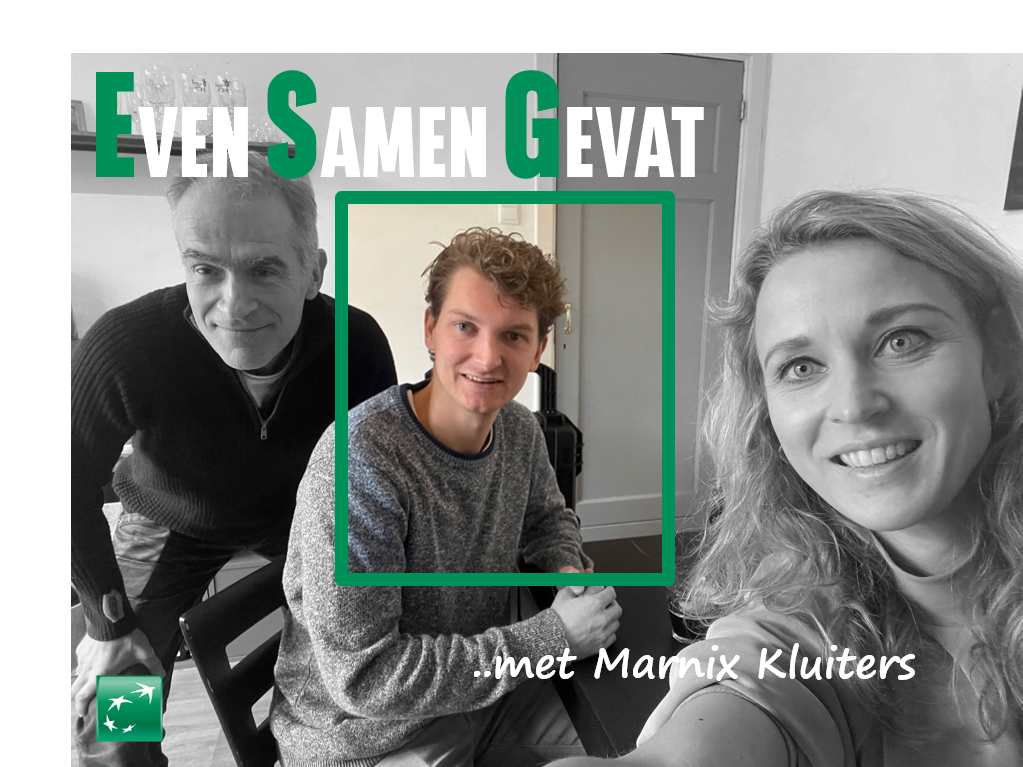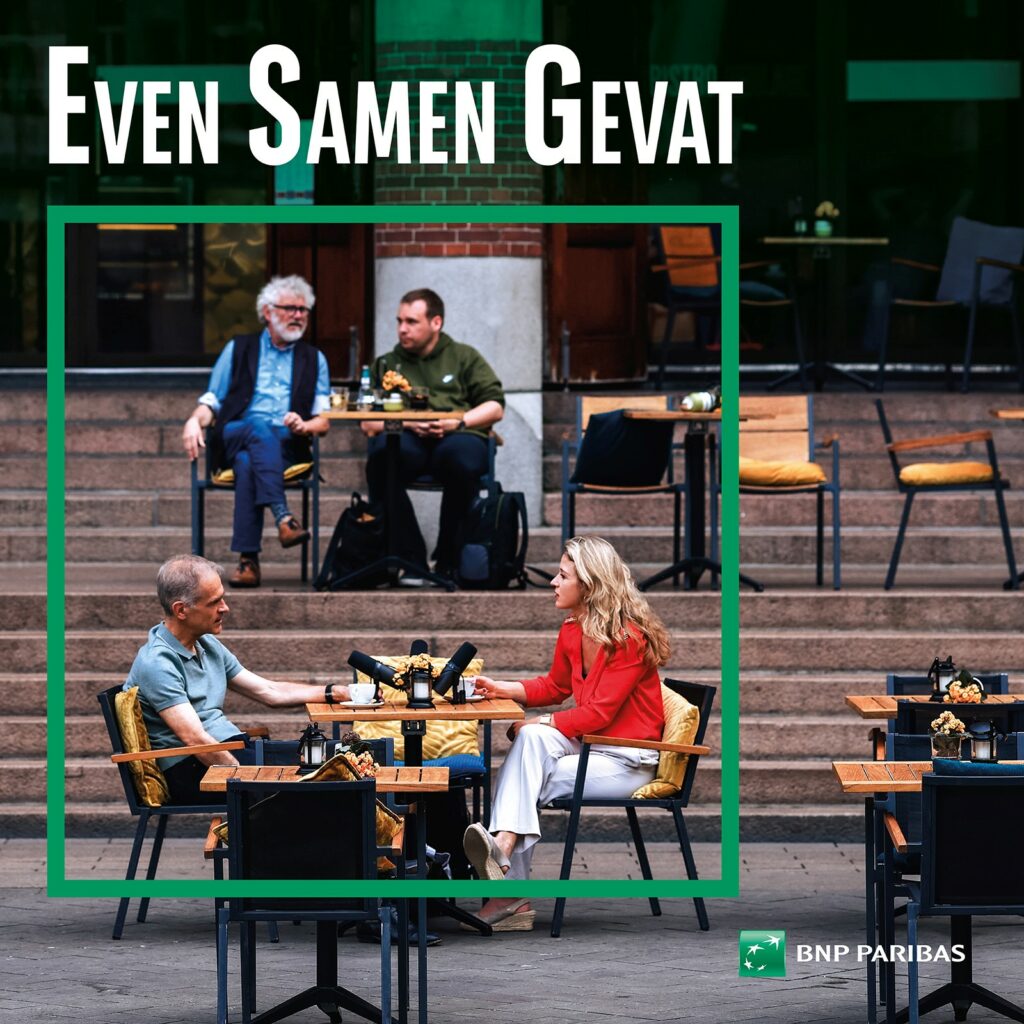100 conversations about sustainability
In episode 17 of ESG (Even Samen Gevat) Marloes and Aldert speak with Marnix Kluiters. Marnix hosts Ecosofie, a podcast where he explores in and through his conversations how we can create an equable society by bringing economics, ecology and philosophy into balance with each other.
Marnix Kluiters started out as a ‘guest booker’ for the podcast Eindbazen. After that, he worked for Van Lanschot Kempen, where he was a podcast specialist, among other things. But now he’s his own boss, and Ecosofie is part of his life’s work. His goal: ‘I want to make an impact.’ One way he does that is by having conversations with people who are willing and able to make a difference, such as Fyke Sijbesma, Jan-Peter Balkenende and Marjan Minnesma. Ecosofie recently recorded its 100th episode, with Rob Jetten, Dutch Minister for Climate and Energy Policy, as its guest.

“I want to make an impact”
In the meantime, Marnix himself has also become an expert, and he wants to start doing more with what he’s learnt in the past four years. So not only does he host his own podcast, but he’s also a speaker: ‘From picking up information to spreading information.’ That, too, is a kind of transition. What insights did he gain in the first 100 conversations and in preparing for those conversations? What’s his view on sustainability? Let’s have a look at a couple of topics.
Justice
Marnix is strongly in favour of everyone getting a fair share of what he calls ‘the environmental pie’. ‘In the past, the Western world used up two thirds of the maximum available CO2 emissions’, he says. ‘What’s more, the current emissions from people in the West are really many times greater than those produced by other people.’ People outside the Western world are right to feel jealous about that, which is why he argues in favour of a new take on the CO2 debate. ‘About 800 million people still have no access to energy, and we certainly don’t want them turning to fossil fuels. We need to get them going on solar energy.’
Tipping points
One conversation that completely changed how Marnix sees things was with Marten Scheffer, professor at Wageningen University, who is known for his ‘tipping points’. That term made such an impression on Marnix that he likes using it in his own presentations too. He illustrates this concept with frogs and canoes, and what it means is that something can go wrong for a long time (such as climate change) without it really dawning on people, who just go on with their ‘normal’ way of life. Until something unexpected happens that turns everything over, like how a frog can cause an already unstable canoe to capsize.
Different lifestyle
Something that Ruud Koornstra said in an ESG podcast got Marnix thinking in a different way. In that podcast, Ruud Koornstra said that in seven years he expects energy to be free. Marnix: ‘That would be a blessing on the one hand, but on the other I wonder whether we shouldn’t see the current crisis as a starting point to examine our lifestyle.’ Shouldn’t we think twice about getting on a plane, and shouldn’t we consume less? He has to search his own conscience in that respect: as a Feyenoord football fan, he enjoys travelling to see the team play. It’s a dilemma, which makes it interesting to think about.
Another dilemma
His conversations with Paul Schenderling and Barbara Baarsma gave Marnix another idea. Paul Schenderling is actually all about economic contraction, and Barbara Baarsma talks about economic growth, but Marnix believes that the debate about contraction or growth is ‘less relevant, because I see that both sides are actually much more alike than that they are each other’s opposites.’ Marnix would prefer a system where ‘the outlines’ make sense and where the ‘pricing and progressive taxation on polluting consumption’ that Paul Schenderling advocates is in order. That will automatically show whether the economy is growing or shrinking. ‘Of course, we also shouldn’t say that affluence is inherently bad.’ We need to go in search of a system that ‘facilitates good things and where the right things pay off.’
“Of course, we also shouldn’t say that affluence is inherently bad. We need to go in search of a system that facilitates good things and where the right things pay off”, according to Kluiters

Three transitions
Marnix sees three transitions in the area of sustainability. The first is consciousness: travelling more consciously, consuming more consciously. The second transition is technological change: ‘What we’re seeing now is that technologies like solar and wind energy are undercutting fossil fuels.’ And the third: the ever-growing bill that we have to pay. The climate disaster is becoming more and more visible, not only in other countries, such as on the ski slopes, but also in the Dutch province of Limburg, during the flooding in Valkenburg. ‘Now we’re actually starting to see what’s happening, but the question is whether it’s visible enough to everybody.’
1,000 episodes
What does the future look like for Marnix himself? Episode 100 of Ecosofie has just been finished, but he still sees plenty of things to talk about: ‘I think I can easily make a thousand episodes, all with interesting new insights.’ He’s currently also been working with Mark Siegenbeek van Heukelum on a book about leadership and sustainability: ‘We hope to publish it this autumn. That will actually give you a crash course on what kind of leadership is needed to speed up the transition to a sustainable society.’ Maybe a topic for the next ESG podcast with Marnix?

“I think I can easily make a thousand episodes, all with interesting new insights”
Marnix Kluiters
ESG Even Samen Gevat is a podcast series (in Dutch) in which Aldert Veldhuisen and Marloes Bergevoet talk to accelerators of the sustainable transition. They discuss topics related to the “E”, like green energy, CO2 emissions, raw materials, biodiversity, the “S” of health, diversity and inclusiveness and the “G” such as laws and regulations and international cooperation.
Also published in this series are:
- The energy transition is also geo-politics – with Rob de Wijk
- Circularity is hip – with Klaske Kruk
- There is life after growth – with Paul Schenderling
Follow Even Samen Gevat here so you don’t miss an episode!
